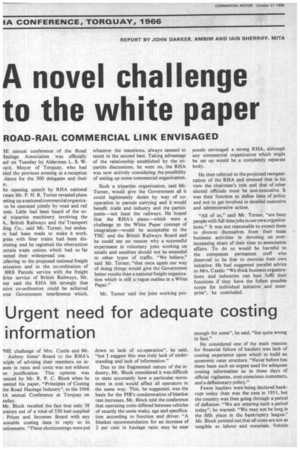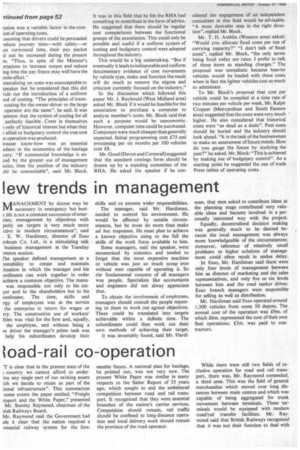Urgent need for adequate costing information
Page 54

Page 56

If you've noticed an error in this article please click here to report it so we can fix it.
'HE challenge of Mrs. Castle and Mr.
Aubrey Jones' Board to the RHA's lciple of advising their members on inases in rates and costs was not without tie justification. This opinion was /anced by Mr. R. P. C. Block when he sented his paper, "Principles of Costing the Road Haulage Industry", to the 1966 IA annual Conference at Torquay on esday.
Mr. Block recalled the fact that only 38 2rators out of a total of 330 had supplied Prices and Incomes Board with any ,sonable costing data in reply to its 3stionnaire. "These shortcomings were put down to lack of co-operation", he said, "but I suggest this was truly lack of understanding and lack of information."
Due to the fragmented nature of the industry, Mr. Block considered it was difficult to state accurately how a particular movement in cost would affect all operators in the same way. This, he suggested, was the basis for the PIB's condemnation of blanket rate increases. Mr. Block told the conference that operating costs differed between vehicles of exactly the same make, age and specification according to function and driver. "A blanket recommendation for an increase of 2 per cent in haulage rates may be near enough for some", he said, "but quite wrong in fact."
He considered one of the main reasons for financial failure of hauliers was lack of costing experience upon which to build an economic rates structure. "Never before has there been such an urgent need for adequate costing information as in these days of official vigilantes, cost-conscious customers, and a deflationary policy."
Fewer hauliers were being declared bankrupt today than was the case in 1951, but the country was then going through a period of deflation. "We are entering such a period today", he warned. "We may not be long in the fifth place in the bankruptcy league." Mr. Block pointed out that all costs are not as tangible as labour and materials. Vehicle cation was a variable factor in the coinion of operating costs.
.ssuming that drivers could be persuaded .educe journey time—with safety—or ,ce turnround time, their pay packet d not be increased during the present Ee. "Thus, in spite of the Minister's Drtations to increase output and reduce ing time the pay freeze may well have the osite effect."
eneralizing on costs was unacceptable to speaker but he considered that this did rule out the introduction of a uniform tad of costing. "The principles of transcosting -for the owner-driver or the large operator are the same", he said. It was Dpinion that the system of costing for all perfectly feasible. Costs in themselves !, only of historical interest but when they allied to budgetary control the true cost ie operation was produced.
ireater know-how was an essential edient in the economics of the haulage istry. "If commercial knowledge is enced by the greater use of management istics, then the position of the industry uld be unassailable", said Mr. Block. It was in this field that he felt the RHA had something to contribute in the form of advice. He suggested that there should be regular cost comparisons between the functional groups of the association. This could only be possible and useful if a uniform system of costing and budgetary control were adopted throughout the industry.
This would be a big undertaking. "But if eventually it leads to indisputable and uniform documentary evidence of cost movements by vehicle type, make and function the result will do much to remove the stigma and criticism currently focused on the industry."
In the discussion which followed this paper Mr. I. Raybould (West Midland area) asked Mr. Block if it would be feasible for the association to purchase a computer to analyse member's costs. Mr. Block said that such a purpose would be uneconomic. However, computer time could be purchased. Computers were much cheaper than generally expected. Initial programming cost 05 and processing per six months per 100 vehicles cost £8.
Mr. Good (Devon and Cornwall) suggested that the standard costings form should be drawn up by a standing committee of the RHA. He asked the speaker if he con sidered the engagement of an independent consultant in this field would be advisable. "A most desirable step in the right direction", replied Mr. Block.
Mr. T. H. Amblin (Western area) asked: "Would you allocate fixed costs per ton of carrying capacity?" "I don't talk of fixed costs", replied Mr. Block, "the only terms being fixed today are rates. I prefer to talk of these items as standing charges." The proposal was unrealistic because heavier vehicles would be loaded with these costs when in fact the lighter vehicles cost as much to administer.
To Mr. Block's proposal that cost per vehicle could be compiled at a time rate of two minutes per vehicle per week, Mr. Ralph Cropper (Metropolitan and South Eastern area) suggested that the costs were very much higher. He also considered that historical costs were "as dead as a dodo". Past costs should be buried and the industry should look ahead. "It is the task of the businessman to make an assessment of future trends. How do you gauge the future by studying the past?" he asked. Mr. Block: "This is achieved by making use of budgetary control". As a starting point he suggested the use of trade Press tables of operating costs.












































































































































